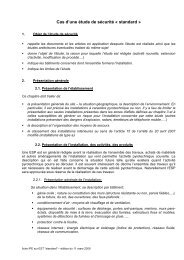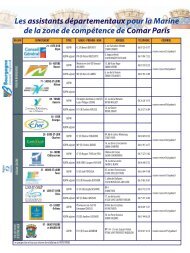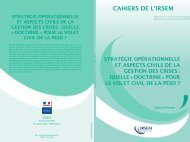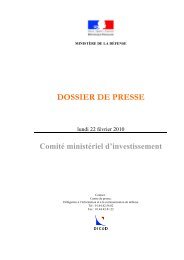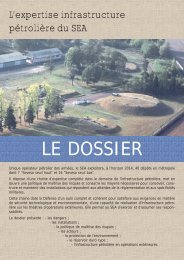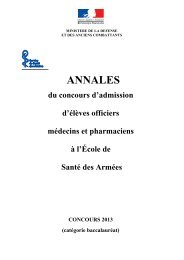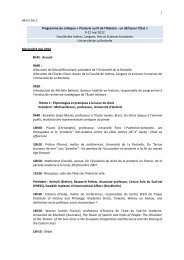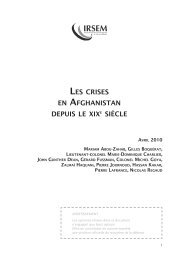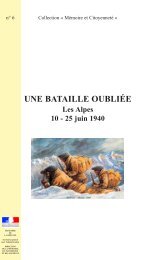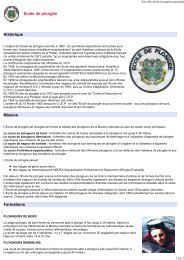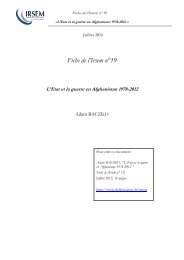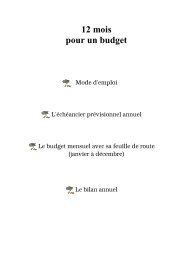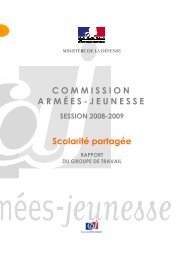Rapport Védrine_ENG_GERMAN - Ministère de la Défense
Rapport Védrine_ENG_GERMAN - Ministère de la Défense
Rapport Védrine_ENG_GERMAN - Ministère de la Défense
Erfolgreiche ePaper selbst erstellen
Machen Sie aus Ihren PDF Publikationen ein blätterbares Flipbook mit unserer einzigartigen Google optimierten e-Paper Software.
In 2011, its total common-fun<strong>de</strong>d budget, excluding operations and missions, stood at 2,419 million<br />
euros, with 1,334 million for the military budget, 875 million for the NATO Security Investment<br />
Programme, and 209 million for the civil budget. The top five contributors are the United States (22.2%<br />
or 582 million euros), Germany (around 14.9% or 416 million euros), the United Kingdom (reduced to<br />
11.2% approximately, or 249.1 million euros), France (reduced to approximately 11.2%, or 247.3 million<br />
euros), and Italy (around 8%, or 208.1 million euros).<br />
With the exception of two naval groups (Standing NATO Maritime Group and Standing NATO Mine<br />
Countermeasures Group) where the countries supply the ships, 17 AWACS aircraft (NATO Airborne<br />
Early Warning and Control Force), and, eventually, the AGS (Allied Ground Surveil<strong>la</strong>nce, with 5 Global<br />
Hawks drones), NATO does not have its own troops at its command on a permanent basis. The units<br />
that take part in NATO missions are <strong>de</strong>ployed voluntarily by the countries for limited time and a specific<br />
mission. The countries contributing to the Alliance's operations retain the right to oversee the use of the<br />
forces that they p<strong>la</strong>ce un<strong>de</strong>r the or<strong>de</strong>rs of the SACEUR.<br />
As for intervention, in the <strong>la</strong>st twenty years, NATO was not called upon to intervene in Kuwait in 1991 or<br />
in Iraq in 2003, when an ad hoc coalition was formed. On the other hand, NATO was used by the<br />
Western countries in the Contact Group in Kosovo in 1999, with the agreement of the other Allies and<br />
the other Europeans, <strong>de</strong>spite a shaky legal basis, and in Bosnia. After the attacks on 11 September<br />
2001, an operation un<strong>de</strong>r the terms of Article 5 was <strong>la</strong>unched for the first time in NATO's history.<br />
Operation "Active En<strong>de</strong>avour" was implemented to protect civil shipping in the Mediterranean from<br />
terrorist threats. NATO was called on to contribute in Afghanistan, as part of the ISAF mandated by the<br />
Security Council in December 2001, and again in Libya in 2011. There was also the NATO Training<br />
Mission Iraq from 2004 to 2011 and Operation “Ocean Shield” <strong>la</strong>unched in 2009 to fight piracy in the<br />
Indian Ocean.<br />
NATO’s strategy<br />
At its 22nd Summit in Lisbon in November 2010, NATO adopted a "Strategic Concept" produced by a<br />
working group chaired by Ma<strong>de</strong>leine Albright and presented as "the most important since 1949". It is<br />
organised around "three core tasks": collective <strong>de</strong>fence of Member States un<strong>de</strong>r the terms of Article 5;<br />
crisis management, to address "the full spectrum of crises"; and cooperative security (partnerships,<br />
arms control, disarmament and non-proliferation) through the <strong>de</strong>velopment of external partnerships.<br />
At the urging of the United States, NATO adopted a ballistic missile <strong>de</strong>fence system to protect territory<br />
and popu<strong>la</strong>tions as a complement to the nuclear <strong>de</strong>terrent. This is a major issue and could cause a<br />
controversy in the future. The Summit <strong>de</strong>c<strong>la</strong>red its good intentions, stating that, "the European Union is<br />
a unique and essential partner for NATO", and acknowledging, "the importance of a stronger and<br />
capable Europe of Defence", thus reaffirming its 2009 position. The Summit <strong>de</strong>ci<strong>de</strong>d on sweeping<br />
reform and renovation of the organisation. It also started preparations for the transition in Afghanistan<br />
and expressed its <strong>de</strong>sire to improve re<strong>la</strong>tions between NATO and Russia, even though these re<strong>la</strong>tions<br />
were strained by missile <strong>de</strong>fence project.<br />
The current discussion of a “comprehensive” Alliance, meaning an Alliance that is political, and even<br />
civil, as well as military, to address the various new threats, is more actively promoted by the NATO<br />
Secretary General,<br />
11



